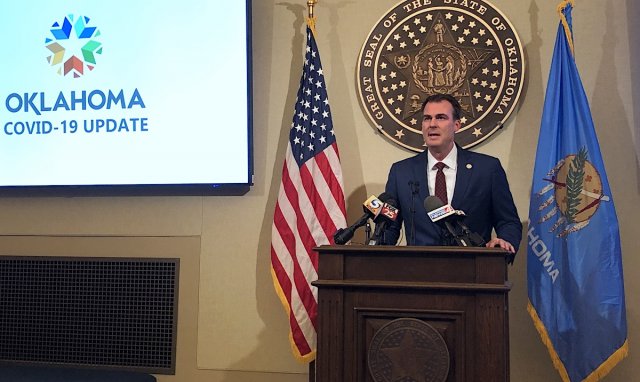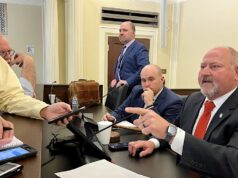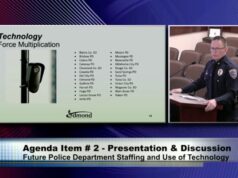
Despite admitting that his office did not respond to a letter from a legislative appropriations leader seeking collaboration, Gov. Kevin Stitt decried a “he said, she said” argument today about who cut whom out of budget negotiations, and he announced plans to veto two budget bills affecting state retirement systems.
“This has been a very disappointing and contentious session, and I am going to continue to expose what I think is going on and let Oklahomans know the politics inside the building,” Stitt said. “I will not play a part in harming Oklahoma’s teachers. I want Oklahomans to know I am vetoing HB 2741 and HB 2742 which would rob from our teachers’ retirement fund, our law enforcement retirement fund and our firefighters’ retirement fund.”
Passed by the Legislature as part of last week’s budget package, HB 2741 and HB 2742 made temporary and then long-term adjustments to the percentages of state sales, use and income taxes apportioned “off the top” to state pension funds. Neither bill changes the payments that state retirees receive.
HB 2741 passed the House with a veto-proof majority, but its 28-19 approval in the Senate would fall short of the two-third requirement for a veto override. The Senate would need 32 votes to push the bill into law despite Stitt’s veto. HB 2742 also received more than 70 votes in the House, but it likewise had only 28 senators support its initial passage.
But in their own press conference following Stitt’s, legislative leaders said the governor is either engaging in “false communication” or simply does not understand the bills sent to his desk.
“If those vetoes stand, there will be a $111.9 million cut to public education,” said Senate Appropriations and Budget Chairman Roger Thompson (R-Okemah). “I believe that our caucus and our chamber will rise to the occasion.”
Wallace: ‘I knew the governor was in the dark’
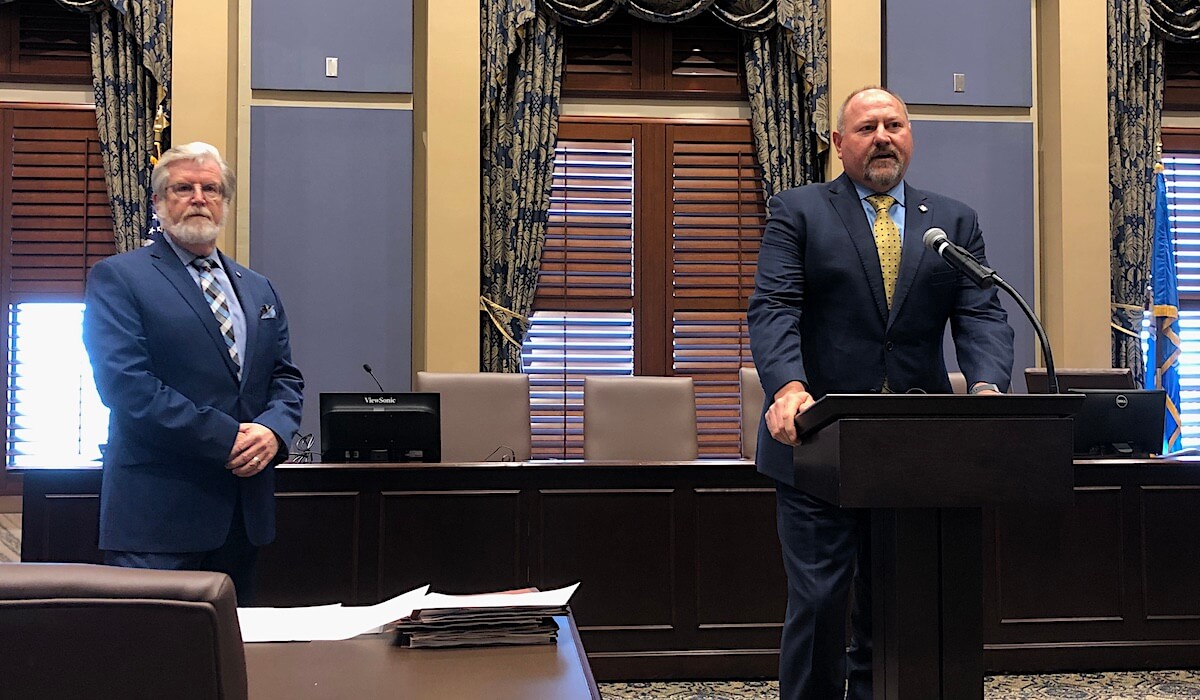
Thompson emphasized that his letter to Stitt administration members on April 27 was about collaboration.
“There is never any reference to backfilling budgets,” he said. “We know you cannot backfill budgets with CARES money, but we do believe that if we are working with agencies and are trying to make sure their needs are being met this year and for years to come we ought to be working together.”
Thompson provided media with a copy of his letter, which was addressed to Secretary of State Michael Rogers and carbon copied to Stitt Chief of Staff Michael Junk, Secretary of Budget Mike Mazzei and Senate President Pro Tempore Greg Treat (R-OKC):
As the chairman of the Appropriations Committee for the Oklahoma State Senate and in the interest of full transparency, as well as, ensuring our system of checks and balances, I would like to request I be involved in the planning for distribution of the $767 million in CARES funds received by the state of Oklahoma.
In addition, I believe the people of Oklahoma would benefit from the governor, along with the House and Senate, working together to decide the best use of the federal funds received to aid in the combat of COVID-19 and it’s devastating effects on our state.
I feel all Oklahomans would be better served by a collaborative transparent effort of spending the federal dollars.
Sincerely,
Senator Roger Thompson
After Stitt’s press conference, Thompson noted that Stitt had been asked twice whether his office responded to the letter.
“The first time he said, ‘I don’t know.’ The second time, he just said, ‘No.’ The second time is very correct,” Thompson said. “No, he has not.”
House Appropriations and Budget Chairman Kevin Wallace (R-Wellston) said he also sent correspondence — an April 24 email — seeking a summit on the funding situation.
“I have not received a response back from that yet. I have stated before and I truly believe there is a communication gap or a lack of understanding within the budget process,” Wallace said. “I know there is a huge gap of information between what is in this budget and the working mechanics.”
Wallace called some of the governor’s statements “inaccurate.”
“I knew the governor was in the dark because his representative had pulled out of negotiations — not once, but twice,” Wallace said.
Mazzei: ‘We have so many Zoom meetings’
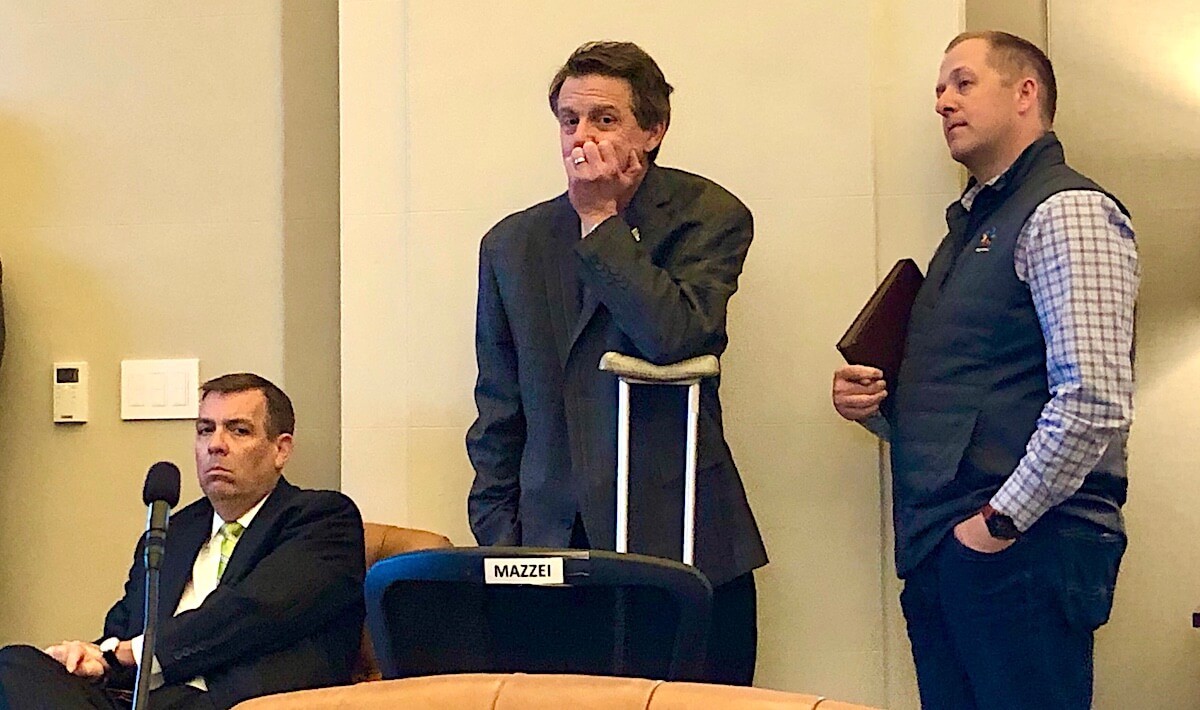
Wallace harkened back to what legislative staff have told him about how state leaders addressed the national fiscal collapse of 2008.
“The last time there was stimulus money coming into the state, Gov. Brad Henry, the speaker and the pro tem of the Senate went into a room and sat down,” Wallace said.
Mazzei, who clarified some of Stitt’s numbers at the end of the governor’s press conference, said he could not recall the last time he sat down with legislative budget leaders.
“We have so many Zoom meetings, I just don’t remember,” Mazzei said, noting that the administration received new guidance last week on how CARES Act dollars can be used. “We were literally waiting on some of that (guidance and) building up our process and our team in advance of making a response to Sen. Thompson, which was literally discussed this morning.”
Wallace said he could recall the last times he, Thompson and Mazzei met, and both were digital gatherings.
“On March 27, the governor’s representative, Sec. Mazzei, made four demands and said that the Legislature would acquiesce to their position or that the governor was terminating negotiations,” Wallace said. “I said, ‘Let me be clear, this is the governor’s position?’ And I recited everything back that he had stated. ‘And if we do not agree to those terms, he is ending negotiations?’ Sec. Mazzei’s response was, ‘Yes.'”
Wallace said House Appropriations and Budget Committee Vice Chairman Kyle Hilbert (R-Depew) took notes about the call. Hilbert showed NonDoc a copy of those notes dated March 27, and they specified four items he said Mazzei called “unacceptable” if pursued by lawmakers:
- A clawback of $20 million in cash from the State Department of Health;
- A clawback of $8.5 million from the Digital Transformation Fund;
- A proposed $2.8 million in Military Department spending;
- Use of the maximum amount allowable from the state’s Rainy Day Fund.
In his press conference, Stitt disputed claims that he had ended budget negotiations.
“I can assure you I never walked out of the budget discussion,” Stitt said. “We were boxed out of the budget discussion.”
Wallace said Mazzei was the governor’s representative who delivered the message.
“It is true Gov. Stitt has never walked out of a budget negotiation,” Wallace said. “He has never been in one this year.”
Wallace said his next and final communication with Mazzei came April 3 on a call that he said Mazzei ended abruptly out of frustration with the Legislature’s planned actions to fill the FY 2020 budget hole April 6.
Calling the situation, “he said, she said,” Stitt told media that Mazzei said he had not hung up on that call.
“We’re all on the same team,” Stitt said, then responding to a question about Thompson’s letter. “Whether we responded to that letter or not, we will absolutely bring every stakeholder to the table.”
Asked what his reaction will be if the Legislature overrides his vetoes, Stitt said “that’s fine. They’ll have to answer to Oklahomans.”
He said his team is still reviewing the rest of the budget sent to his desk, and he reminded the public that his office had led the way on saving $200 million additional dollars in last year’s budget.
“Luckily we went into this with $1 billion in savings. If you remember, we got criticized last year by wanting to save $200 million,” Stitt said. “And some of those folks, you can pull out their tweets, they were making fun of the governor about wanting to save $200 million. And I said, ‘The time you have to save is during the good times.'”
He expressed concern about the Legislature’s heavy reliance on about $319 million of “one-time cash” in building the FY 2021 budget, which he has until Wednesday night to sign, veto or line-item veto.
“We’re not going to have that one-time cash in that 2022 budget,” Stitt said. “So there are a lot of things that are going to hit us in 2022.”
(Update: This story was updated at 8:30 a.m. Tuesday, May 12, to clarify details about the two bills in question.)








